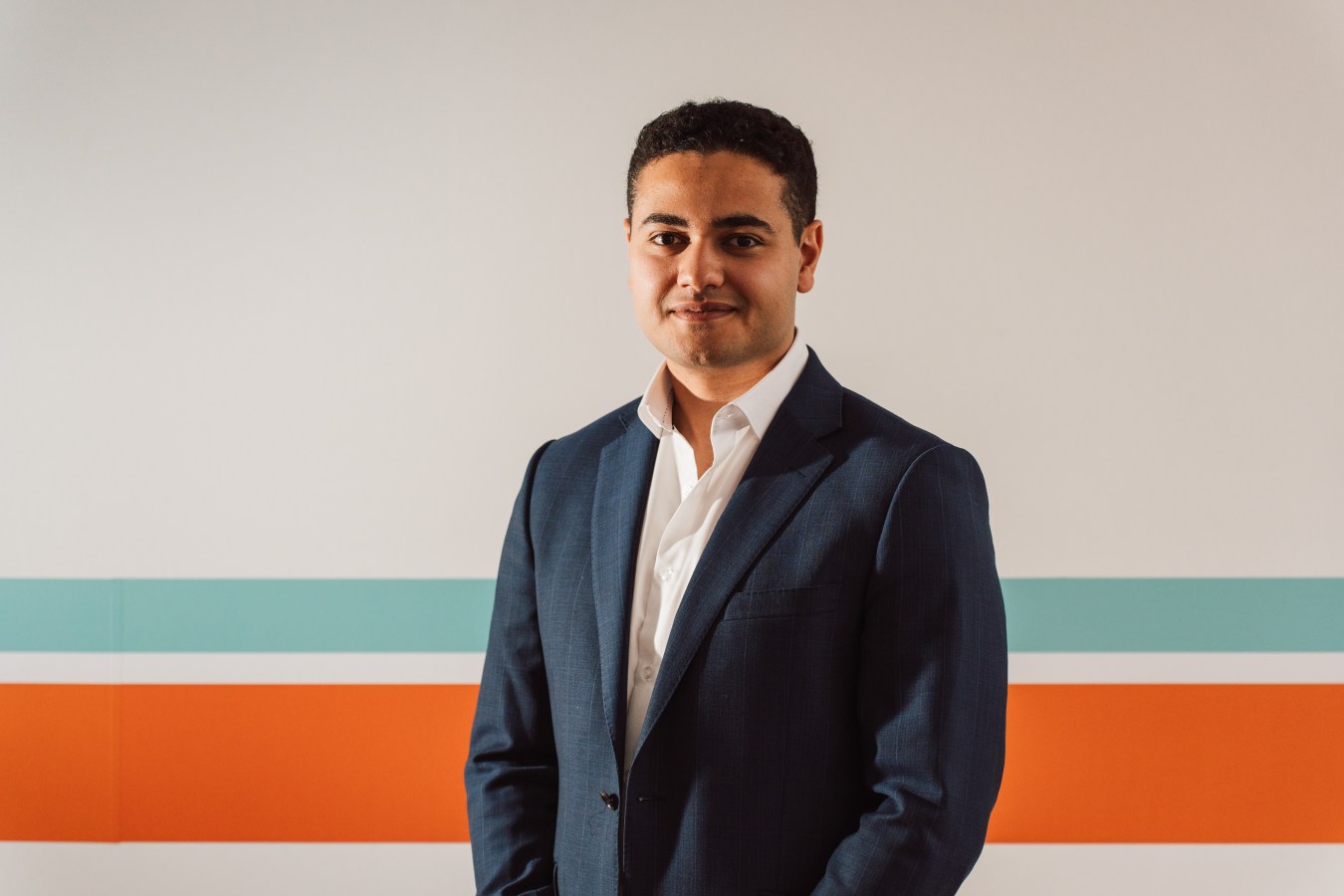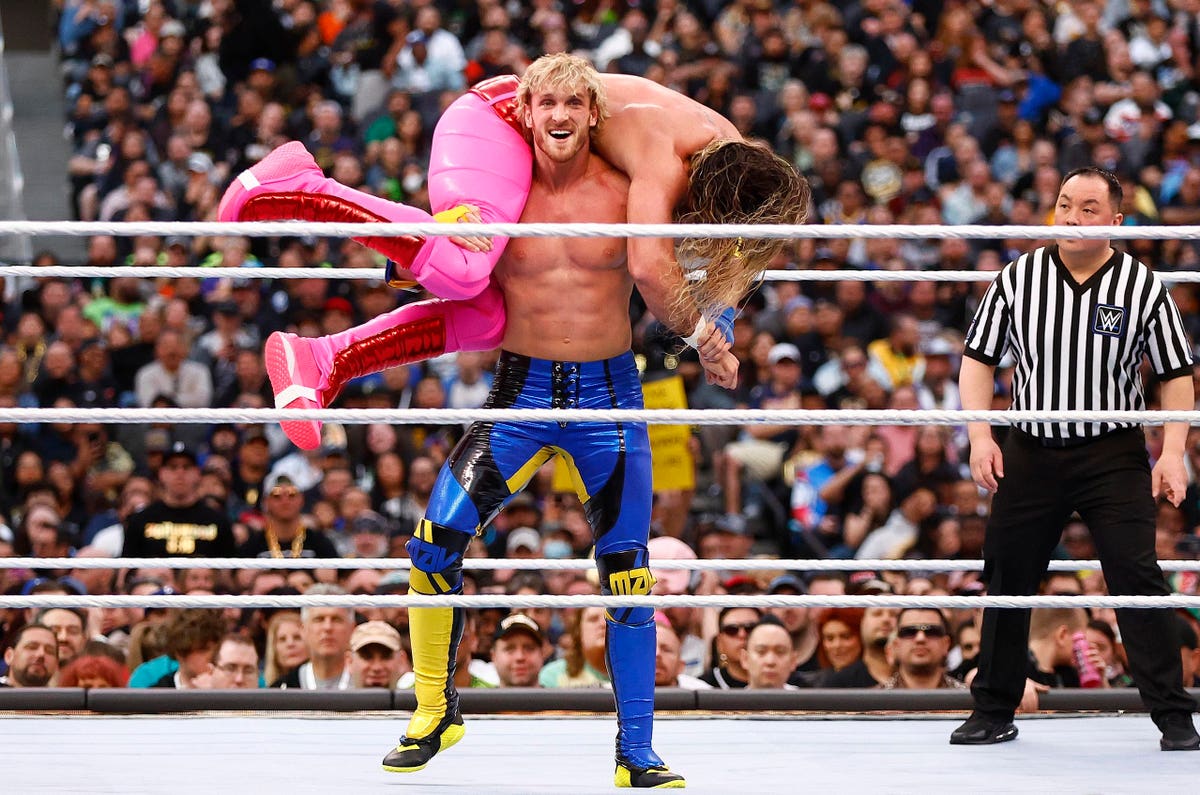Best known for his beard and ubiquitous vans, Jim Penman has quietly built a franchising giant, while funnelling profits into a scientific mission.

When Jim Penman’s PhD thesis was rejected in 1982, his thoughts of a career as an academic historian were dashed. Instead, his mind went to the long game. He just needed to get rich to fund the research to prove the naysayers wrong.
He’d already spent 12 years at university, mowing lawns furiously at weekends to support himself at $5 a lawn. He knew that mowing was no path to riches. So, he tried selling mowers, computers, and a tourism venture. All failures. He was awkward with people. Couldn’t sell to save himself.
So he kept mowing.
Forty years later, the 73-year-old heads a 5,000-franchise, $1-billion-a-year empire with his young, bearded face on thousands of trailers crisscrossing Australia and New Zealand in 40-plus divisions from antennas to dog washing. But Jim Penman, founder of Jim’s Group, has built more than just Australia’s biggest franchisor – he’s created a strange and sprawling legacy powered by obsession, ethics, and epigenetics.
Wearing Kmart shoes and sharing household chores with his wife, he’s spending $3 million a year on his attempt to stand up that 1982 thesis – attempting to explain the rise and fall of civilisations, to explain the human condition and [maybe] to fix it with a pill.
Jim’s thesis
Born David Penman, young Penman took a year off at the end of high school and worked on a farm north of Perth. Another David worked there, so they called the new bloke “Jim”. Back home in Melbourne, he kept the name and put an ad in the window of a local hardware store looking for gardening work.
When he enrolled in sociology at La Trobe University, he thought he would learn about societies. “I hadn’t done enough preparation to know that sociology is basically garbage, so after my first year, I switched to history.” He was gardening at $1.50 an hour, but in the mid-70s he bought a car and started mowing lawns because that paid $5 a lawn – $10 an hour if he was fast – mowing furiously on weekends, studying obsessively through the week and all through the holidays. Never stopping, he says. The outdoor work kept him “solvent, happy and healthy”.
Penman was pursuing a PhD at La Trobe for over a decade. He pondered an academic career, but what he wanted more was “to understand the reason for the rise and fall of civilisations”, which he’d been pondering since he was 14 when a friend had given him a copy of The Peloponnesian Wars by Thucydides.
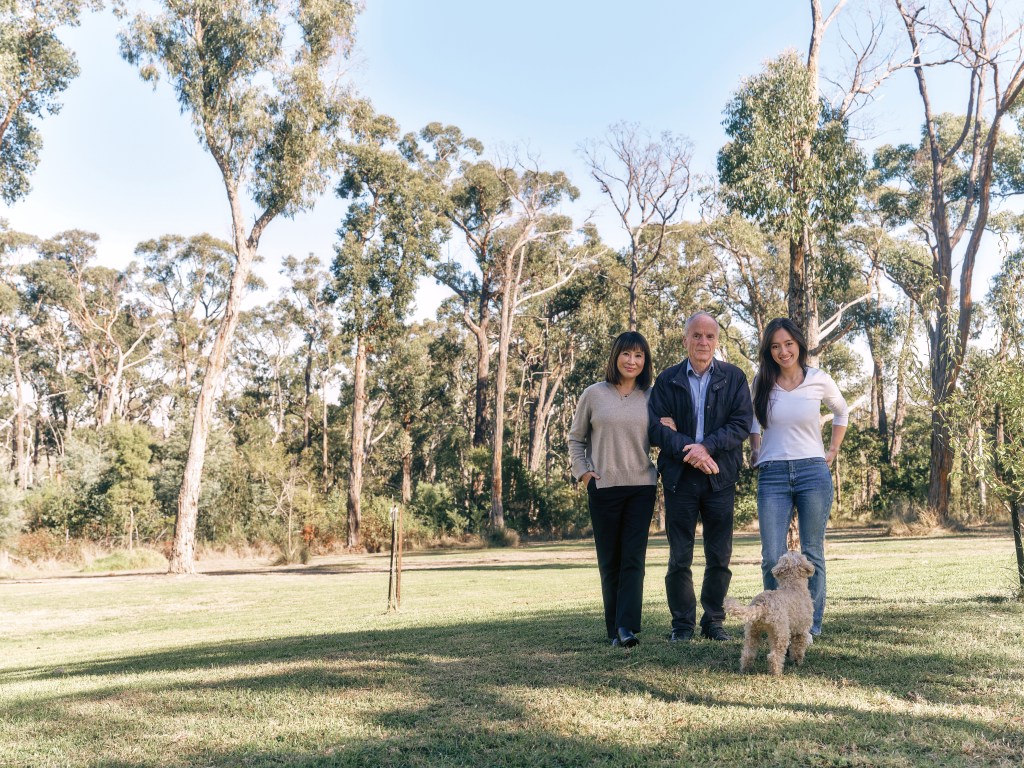
His PhD thesis veered into cross-cultural anthropology, biology and zoology as he tried to defend his notion that it was all about character – that over time people became less hard-working, less warlike, and their loyalties switched to individuals rather than institutions. “Eventually, wealth saps this character that makes you good at these things.”
“It’s the same basic biological pattern that happens when lemmings reach a population peak and migrate. It’s what I call a lemming cycle”
Selling by not selling
Thoughts of an academic career evaporated as his thesis was met with “blank incomprehension”. He knew more work in biology, genetics, and animal studies was needed to stand it up, but he had no training there. Newly married, he had bought a $30,000 house and was deeply in debt. “Being married was good for me,” says Penman. “I was very flaky before that.”
As his various ventures failed, the lawnmowing chugged along. People wanted punctuality and attention to detail. He put on subcontractors. But when the opportunity to resubmit his thesis came up, he decided to sell the run.
“The fundamental idea is that the environment you live in changes your behaviour — and if enough people change, society changes.”
Associate Professor Terrance Johns, head of Epigenes
He had a buyer interested, but the guy vacillated, during which time new customers kept coming. “By the time I handed over the business to him, I had another full-time run. So I said, okay, I’ll put this second business on the market, and the same thing happened.”
He saw the opportunity in building and selling runs. “But I was a terrible salesman,” says Penman. “I’m not very good socially. I’m awkward, but found that if I stopped worrying about my interests and started thinking about the person I was dealing with, I did much better. So, rather than pitching my business, I would try to advise people on how to get into business. I’d often tell them to buy another business if I thought it was a better deal.
“If they bought it, I did everything I could to help them be successful. If they lost a regular client, I’d replace them. And every time somebody bought a run off me, I’d put their name and phone number on a bit of white card and I’d stick it on a board. If anybody was interested in buying a run, I’d say, ‘Ring any of those guys and ask them.’”
By 1986, he thinks he might have sold more than 100. He was doing okay, but didn’t think it was the path to funding his institute. And that’s when VIP Lawn Mowing moved into Melbourne from Adelaide, threatening to upend everything with their slick brochures and franchising model.
“I thought these guys would crush me,” says Penman. “I had no idea what franchising was about.” He rang VIP and offered to help build runs for them, but was rebuffed. “I thought, ‘All right, better see if I can compete with these guys.’”
“In Chinese culture, we don’t do a lot of ‘loves and hugs’. If I ever say ‘well done’ it means I’m really impressed … I was very pushy to my kids.”
Li Penman
He couldn’t see why someone with a lawnmowing business would want to stay with a franchisor if they had a full roster of clients. So when he brought in lawyers to write up contracts for his own franchising idea, he found it hard to get them to understand what he wanted. “I mean, they were idiots. They kept saying to me, ‘You’ve been too nice,’ because I wanted to make a system so that you’d be mad not to join.
“I wanted to put a lot of protections in for my franchisees. That was the foundational idea. Such as getting the right of first refusal to jobs in their territory, but they can work wherever they like. They can build their business to any size, and their fees don’t change – automatic right of renewal at the end of the contract. Not taking any money from suppliers.
“And I was determined that I wasn’t going to put anybody on who I thought might fail.”
If all went well, he thought, he might one day get 100 franchisees. But he went from 12 to 60 in the first year. His sales secret was, again, just handing out the phone numbers of existing franchisees. “My guys sold it, not me.”
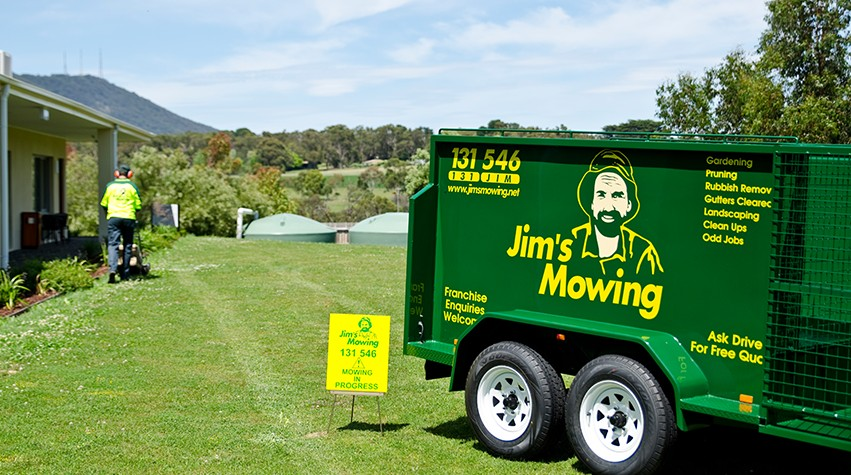
Jim’s jobs
As the mowing business grew, Penman thought the model would also work for cleaning. “But…” he says, pointing at the Jim’s logo on his shirt, “nobody’s going to want this bearded guy with a floppy hat cleaning their house. So, I called it Sunlite and did this little logo with these sprays. I sold a couple of franchises, and it was terrible. I couldn’t find work for them, so I eventually returned their money.”
“I’m blowed if when I’m dead somebody’s going to come along and sell to someone who’ll rip off my franchisees.”
Jim Penman
A few years later, he was approached by a meticulous mowing franchisee, Ron Goldstein, who wanted to start Jim’s Cleaning. Penman told him why it wasn’t going to work. But Goldstein persisted, and apparently people did want the guy in the floppy hat cleaning their homes.
It’s hard to get a number of how many Jim’s spin-offs there are now. A new one starts every three months, like the latest, Jim’s Personal Fitness. But many fold too, like an earlier iteration of Jim’s Personal Fitness. There are “a bit over 40” divisions, he says.
“It’s not meaningful because you’ve got a division like Traffic Control, which has one franchisee – just a failed division. We can’t let it go because there’s a guy in it, but it’s a failed division. We don’t consider the division serious until I have at least 30.”
Mowing is the largest, with 2,200 franchises, followed by Cleaning at 1,700. In many, it’s a shortage of franchisees, not customers, that is the problem. The entire Jim’s Group knocked back a quarter million sales leads last year, with Dog Wash, Fencing and Mowing being the hardest with which to get a job done.
“I’m not exactly wealthy, you know. Wealth wouldn’t even come in my top ten aims.”
Jim Penman
Penman spends about half an hour every day reviewing all complaints and all one-star reviews. He’s the only person in the company allowed to delete a complaint from the system. The most common problem is failure to follow a sales lead. He’s bringing in an automated system, Jim’s Jobs, where, if the franchisee hasn’t returned a call within two hours, they’ll get a text reminder. If they haven’t returned it in four hours, Penman’s recorded voice will yell at them: “Make the call!”
Jim’s institute
Penman never forgot his big idea. [Dr Penman’s PhD thesis was accepted in 1984] “All through the 80s and 90s, I used to get up very early in the morning, put the gas fire on in the middle of winter, and just write and read. I used to go to the Monash University bio-med library to read.”
Perhaps he wasn’t as present in his marriage as he might have been. “I’m actually a terrible husband because three different women couldn’t stand to live with me.”
His first marriage produced five children who he was devoted to and who he would have on weekends. “That put enormous pressure on my next two marriages, which is understandable, and then I met Li. She had it hard, too, but we got through it. She’s just wonderful.”
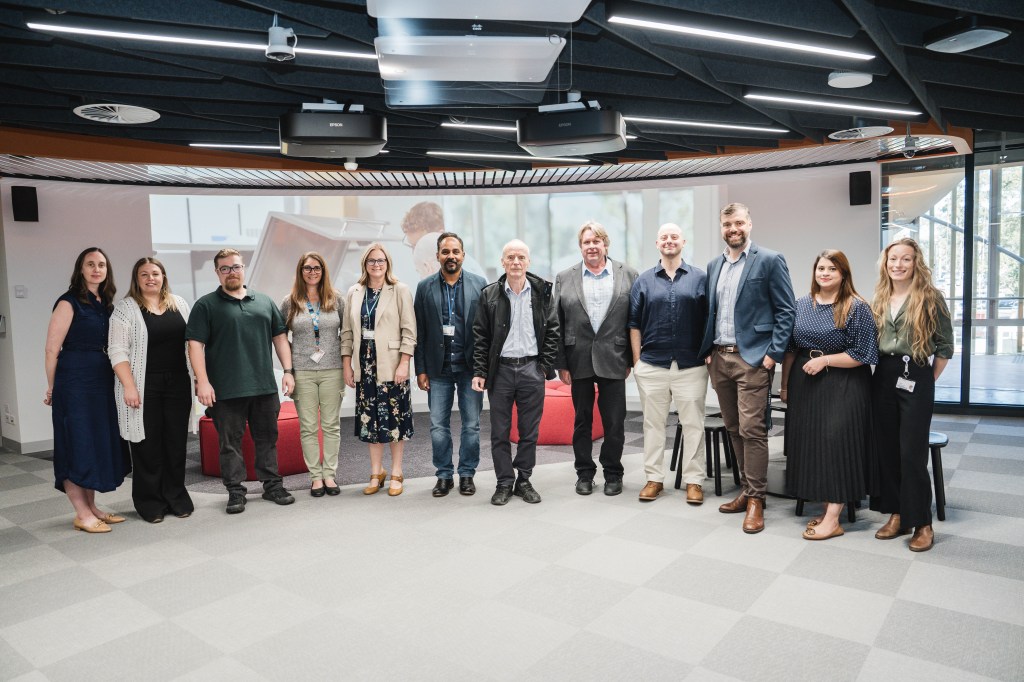
Li Penman, a divorced single mother from China, was doing a Master of Education (Management) degree in Melbourne when a classmate introduced her to Penman. They were married in a year. She says there were “lots of challenges and doubts” early on. “I give him most of the credit for getting us through, because I’m a very emotional person, and Jim is very solid. If he weren’t strong during the first years of our marriage, we wouldn’t be here 24 years later, still passionately in love.”
With no interest in spending money on himself, Penman found two researchers at La Trobe University, Tony Paolini and Steve Kent, whose research lined up with his ideas. He emailed them, offering “a few hundred thousand dollars a year” to do some research on food restrictions in animals.
He wasn’t interested in the health benefits of fasting. His theory needed data on what it did to animal behaviour. “For example, when you restrict food for rats, they become more exploratory for a start,” says Penman. “They also become much better mothers. They spend more time with their offspring; they’re kind of more hard-working.”
Jim’s epigenetics
Penman has for the last several years put $3 million a year into supporting his PhD history thesis. Starting with Paolini and kent, it grew into a research institute and has since morphed into a “philanthropic start-up”, Epigenes Australia, hoping to cure mental illnesses with pills.
“The fundamental idea is that the environment you live in changes your behaviour, and if enough people have changed behaviour that changes the society you live in,” explains Epigenes’ head of research, adjunct professor Terrance Johns. “That’s an idea that any reasonable scientist would accept these days. However, when Jim was writing his thesis and even his book, the problem was that there wasn’t a mechanism to explain it. That’s where he came unstuck.”
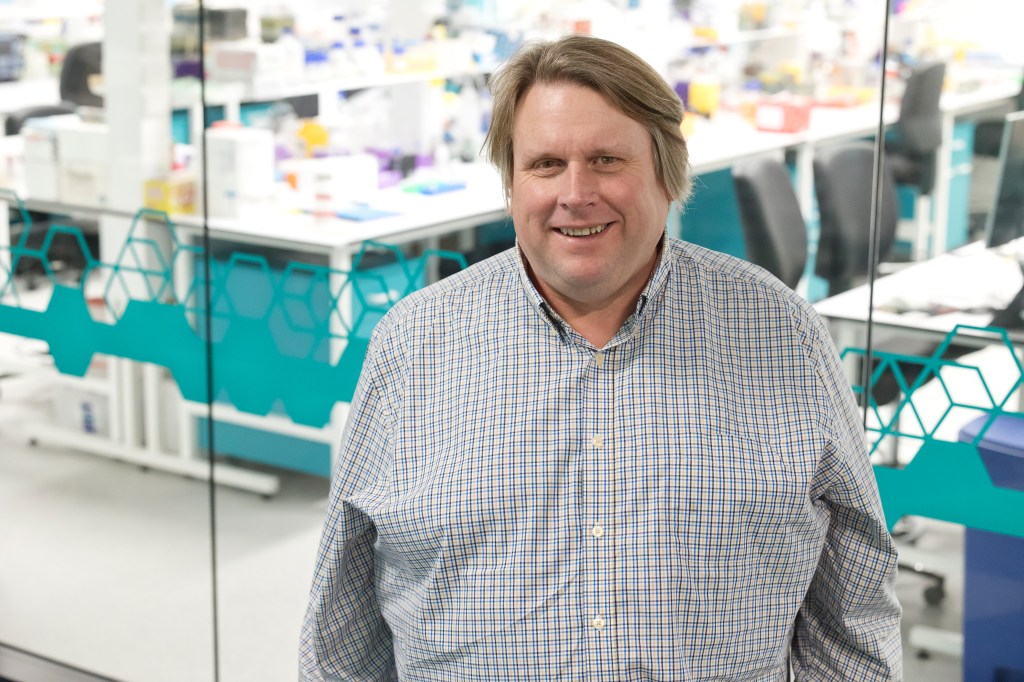
There have been massive advances in the field of epigenetics, the switching off and on of genes, and even how those switches can impact following generations, says Johns, all of which was scientific heresy in 1982.
“It’s been proven in rodent models for a long time, but in humans it’s only been proven in the last 12-18 months,” says Johns, 61, who came to Epigenes from running cancer research at Perth’s Telethon Kids Institute. “You can see the epigenetic changes in individuals who experience certain events, and you can see it in their offspring, and that can go on for three generations.
“Jim has been focused on this for 20 years. I’ve only been around for two. Jim is focused on calorie restriction. We map the epigenetic changes associated with calorie restriction. In rodent models, it reduces anxiety and depression-like behaviours.
“We’re trying to understand the epigenetic changes so we could perhaps develop drugs that mimic calorie restriction, because we’re not going to get society to reduce their calories by 25% to be mentally healthier. That’s just not going to happen. So we’re trying to find ways of drugging that to mimic the mental health benefits.”
Johns predicts they will have two or three drug candidates “worth going into patients” within 12 months.
And while Epigenes’ team of 11 researchers applies its results to finding treatments for anxiety, depression and perhaps PTSD, Penman takes it and applies it to his historical/social theories.
“People always ask about my dad and how he inspired me, but honestly, it’s probably been my mum that’s been more useful throughout all of this.”
Sylvia Penman, founder of Jim’s Removals
When Johns interviewed for the job, he was given a copy of Penman’s 2015 book, Biohistory, Decline and Fall of the West, which, according to the cover blurb, “draws on history, biology, anthropology and economics to explain … how evolutionary mechanisms designed to adapt animal social behaviour to changing food conditions determine the fate of civilisation”.
“I don’t agree with a lot in the book,” says Johns, “So that was difficult at the start, because I think he was hoping for a convert, but I agree with enough of it that I can help him achieve what he wants to achieve.”
Jim’s advice
When Sylvia Penman was setting up her own Jim’s franchise, Jim’s Removals and Storage, her parents argued over how she should approach it.
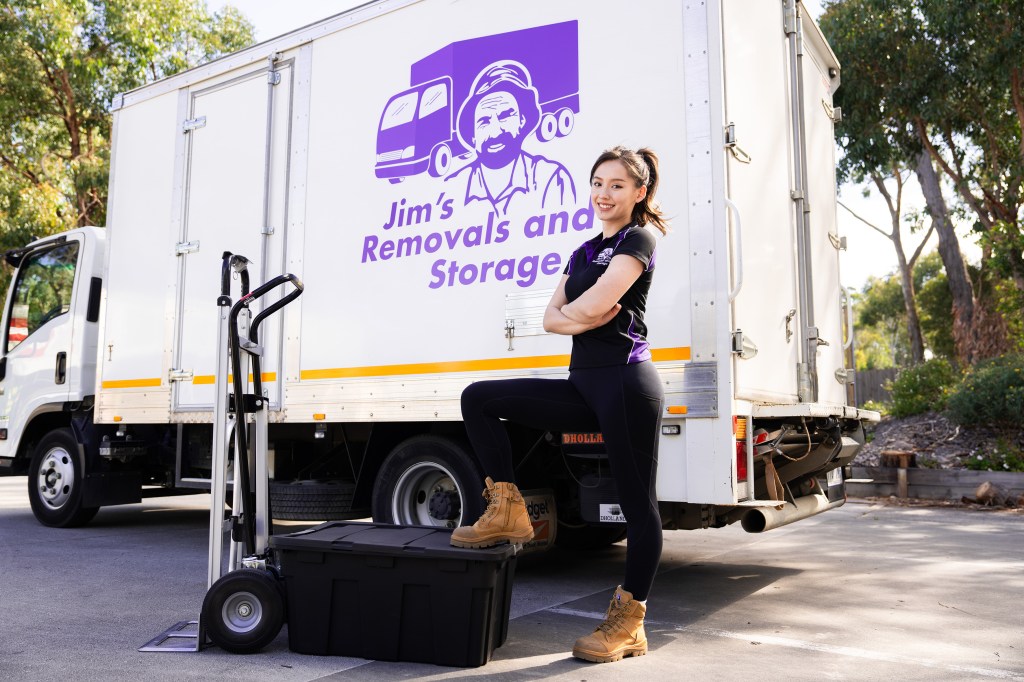
“Mum was like ‘Don’t even think about accepting leads until you’ve got everything in place.’,” says Sylvia, 22, the third youngest of Jim Penman’s 10 children. “And it was this huge fight between the two of them. Dad was like, ‘No, jump right in. Just get started. We need movers.”
“My dad’s big picture, big ideas. Mum’s the complete opposite. She’s so grounded, and every single business that she starts, she makes it her mission to know everything about that business. She has a construction business and knows how to do everything that all her trainees would do. It’s amazing.”
Sylvia, a philosophy graduate, [“My dad calls philosophy ‘navel gazing’”] worked at a friend’s removals business while at university and for a year afterwards. She thought she could see ways to do it better. “It sounds a little naive because I was in my early twenties. I talked to my dad about all these ideas, and he said, ‘Why don’t you come to Jim’s and start the removals business?’.”
There had been a previous, failed, iteration of Jim’s Removals. Sylvia and her partner are trialling a new structure with no franchising to keep a tighter rein on quality control. They’ve only got one truck but are hoping to scale fast.

“People always ask about my dad and how he inspired me, but honestly, it’s probably been my mum that’s been more useful throughout all of this.
“Mum is the one who works the longer hours. She would be getting up at 6 am, then coming back at 6-7 pm. She even did night school for a while for construction, so sometimes she’d be getting back at 10 pm after working a whole day, whereas Dad is usually at work at 8 or 9 am and then finishes up like 4 or 5pm.
When her father cooked dinner, it was just vegetables in a pot. [“He’s a health fanatic.”] They craved their mother’s Chinese food.
“Every time I have a problem, I go to both of them and they give me two completely different answers.”
She usually goes with Mum.
“I’ve seen Mum work so hard ever since I was younger. You can’t help but look up to that, especially because she doesn’t need to. My dad would be 100% happy to take care of her. They split all the household chores equally, so my dad also does a lot of washing up and cleaning, compared to my mom.”
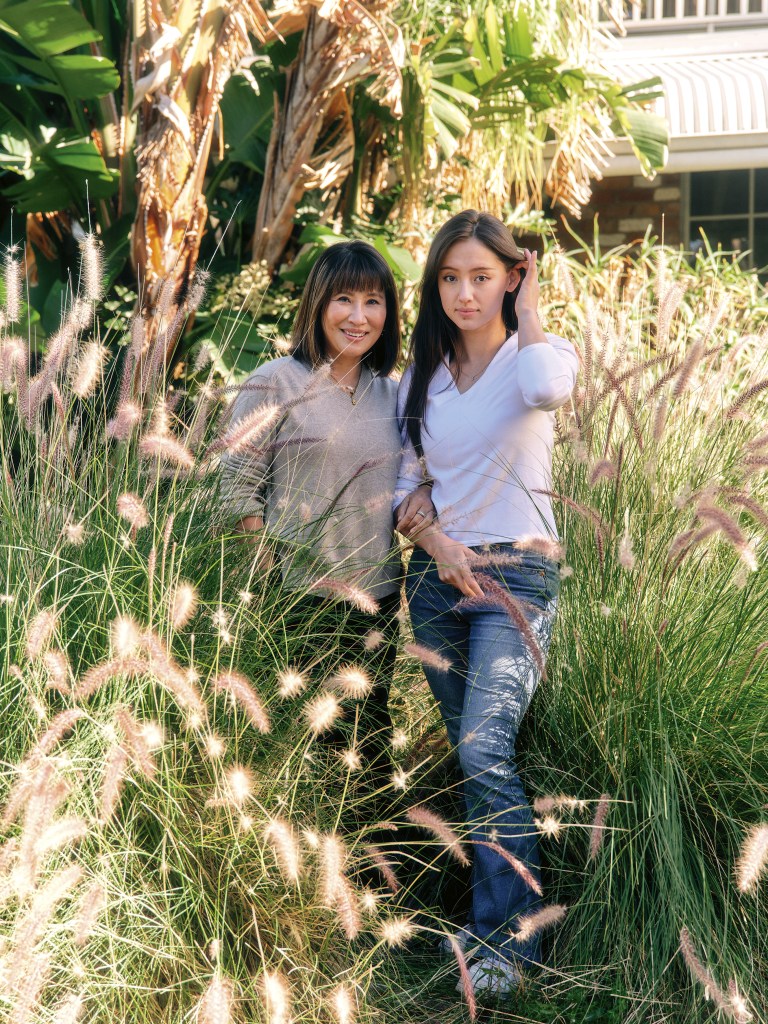
And what’s the biggest lesson she’s learned from her father? “Dad is all about, ‘Money is never, ever the reason you do anything’,” she says. “It’s always just been, ‘Be a good person, bring good into the world and always focus on your employees first.’”
Jim’s wife
Last Mother’s Day, Li Penman was playing games after dinner with her kids when her adult daughter Jasmine piped up. “Why don’t we all tell one good memory we have with Mum?”
Li was petrified. “In Chinese culture, we don’t do a lot of ‘loves and hugs’. If I ever say ‘well done’ it means I’m really impressed. I was so worried because I was very pushy to my kids. What were they going to say? This will be so hard for them.”
LI Penman need never have worked another paid job in her life after marrying Jim Penman in 2002.
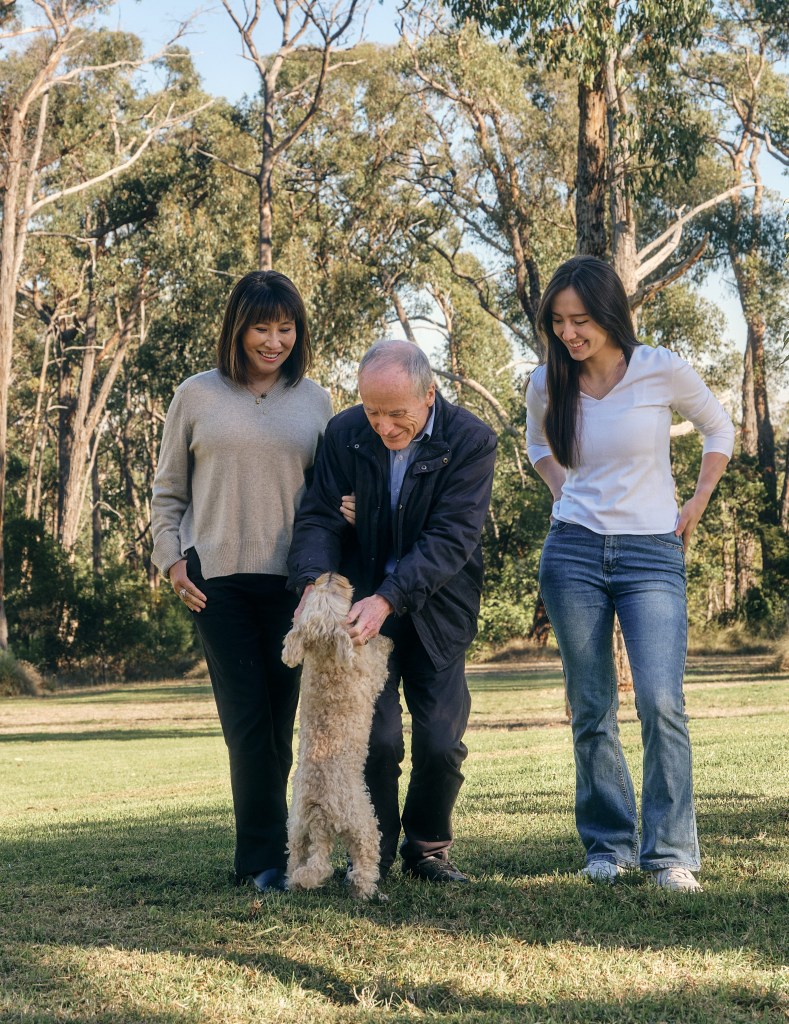
“Staying home, being Jim’s wife, it’s not enough. I want to learn how Australian people live. I want to get into the culture and so with that in mind I got into a health club business and I failed miserably. I lost all my savings from China.”
She learned that nobody would look after her business as lovingly as she would.
As she raised their four children – with the chaos of Jim’s other six kids staying over every weekend – she was repeatedly brought into the Jim’s business to fix various problems at head office. When her youngest was four, ten years ago, Jim got her to manage the construction of the Foothills Conference Centre he was building at Jim’s headquarters in Melbourne’s outer north-east.
She realised she loved the process and decided to start a construction company to do housing subdivisions. She thought she could bring others in to do the specialist jobs, but kept learning that lesson—that no one cared as much as she did. She did a cert 4 in construction at night, made all the mistakes and Jim bailed her out once – never criticising her, she says. She has now built 60 projects and is working on another venue.
And as she approaches 60, with her youngest child 15, she has no intention of stopping.
“Believe it or not, I feel like if I keep doing this, I’m setting an example for my children. No matter what age I get to, I want to be able to offer them real advice, like from my life experience. Whether they ask for it or not, I know I have it in me. So I want to experience life. It came with a lot of challenges, you can imagine, right? Disputes on construction, me and Jim fighting sometimes, but I feel like while I’m doing all this, it’s going to make me a better person, a stronger person.”
And so her children came out with their Mother’s Day game answers.
“They all jotted down something similar,” Li recalls. “They say, ‘Mum, you love with action.’ … That made me feel happy. I have done a mother’s duty. I made my kids so strong, such good workers, very disciplined.”
Jim’s laundry
As we wind up the interview, Penman goes to the kitchen to show off some of the potatoes, zucchinis and pumpkins he grew in his permaculture garden [Jim’s Permaculture was another failed division] on his farm, a half hour’s drive east in the Yarra Valley.

“Li cooks most of our food. We live very comfortably.” He points at a large fruit bowl. “There are two things I have no limits on, fruit and books. That’s quite a significant cost since I buy about three books a week.” He is animated as he scrolls through his Audible downloads, an eclectic non-fiction list, ranging through business, science, happiness and social media. “I’m listening to a wonderful book now about Robert Moses, the guy who did the New York park system.”
Jim Penman is puzzled as to why Forbes Australia would be interested in him. “I’m not exactly wealthy, you know. Wealth wouldn’t even come in my top ten aims. For example, last year, I put a clause in the franchisee contract that says that a controlling share of Jim’s Group cannot be sold without the written consent of a majority of franchisees. When I told my CFO, he said, ‘You know this is going to really collapse the value of your business because it makes it almost impossible to sell.’ I said, ‘I know that, but first, I don’t intend to sell it, and I am blowed if when I’m dead somebody’s going to come along and sell to someone who’ll rip off my franchisees.’
“When you look at the fees we take, if I put an extra, say, 45 bucks a month on every franchise that I sold from now on, within a few years, I’d double my profits. But I don’t do it. It’s just not what I’m after. And the money that I do take out, I would give away something like 90% [to Epigenes].”
His children range in age from 15 to 40. He’s set up a trust that will help them and their descendants buy a house and not much else.
The modest-sized house has the busy clutter of a place occupied by two full-time people. Jim’s Cleaning comes by once a month. He walks us out to the backyard, which could, frankly, do with a mow.
“That’s where I hang out the washing. I do the laundry once a week, and I hang it on the line there.”

